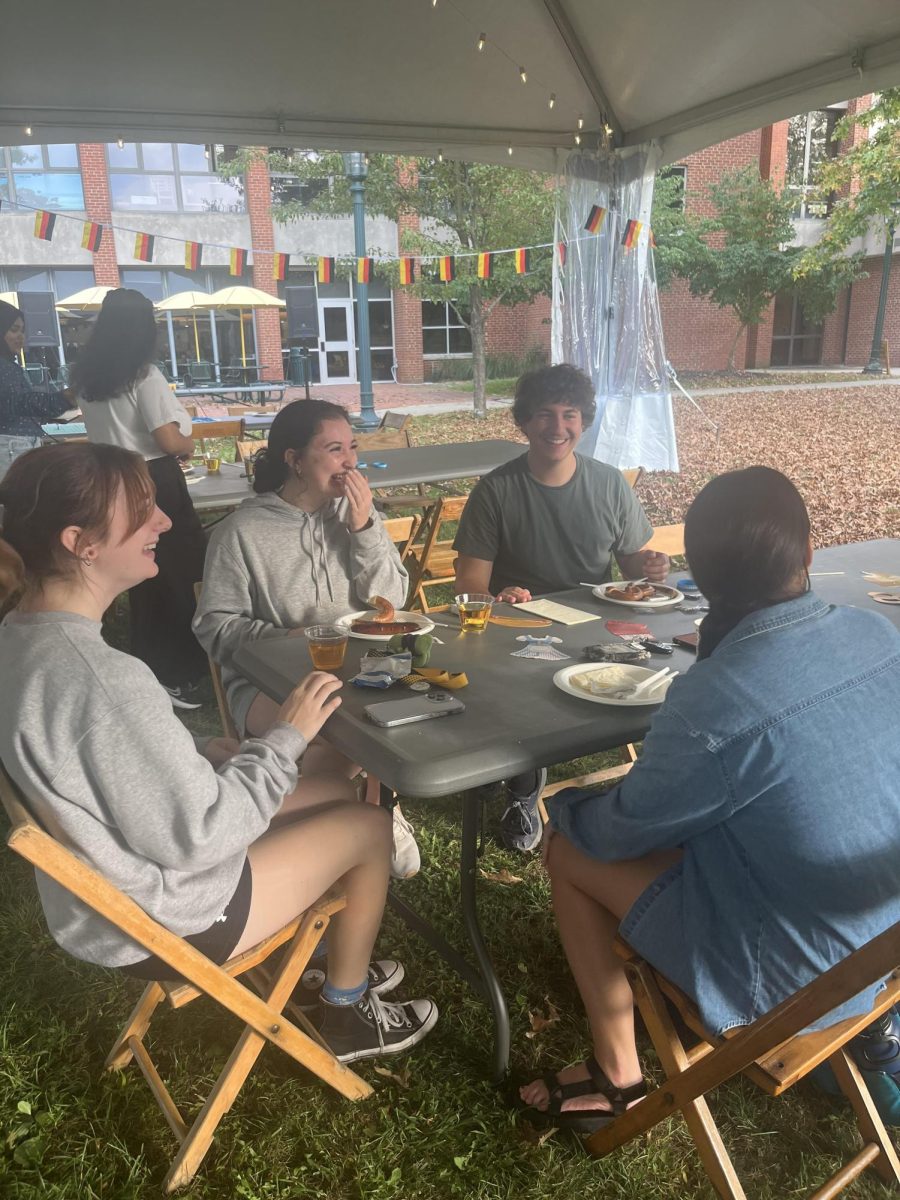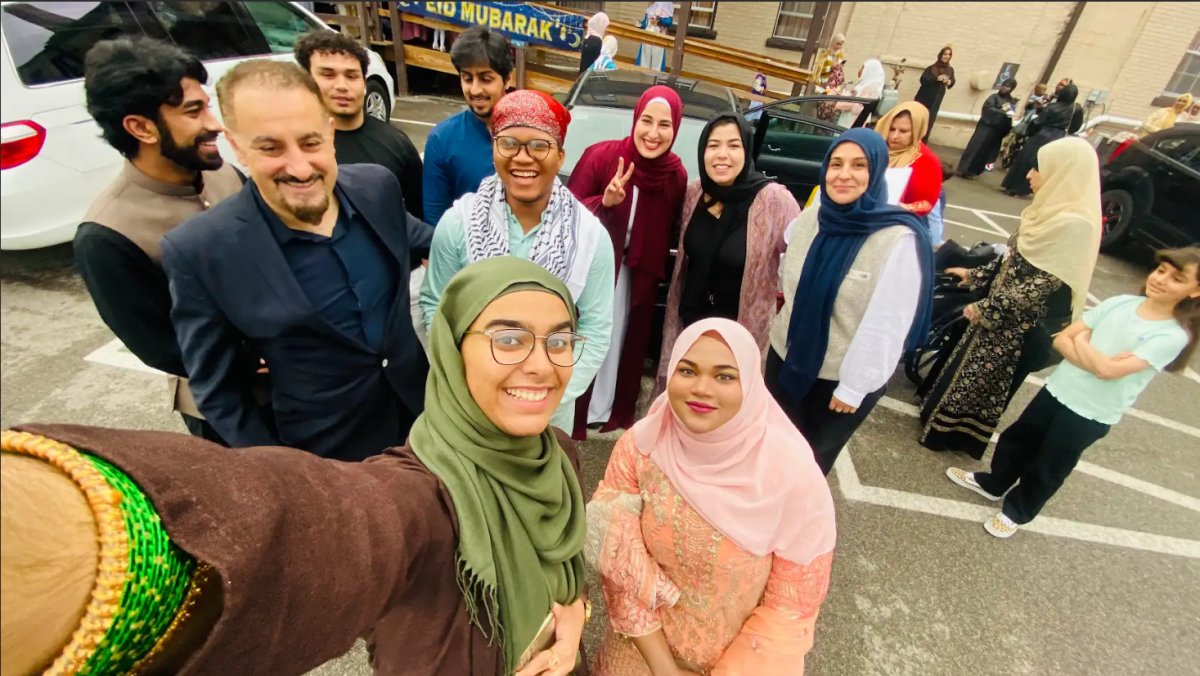The German program hosted their annual Oktoberfest event at the Gator Quad on Wednesday, Oct. 4. Oktoberfest is a Bavarian festival that celebrates the transition from the harvest season to winter. The celebration is an exclusively southern German tradition, but it has been spread around to Austria.
“Oktoberfest is something we do more or less every year, and people like it a lot, people know it,” said German Teaching Assistant Yannick Borrman. “It goes way back. It’s not quite the equivalent of Thanksgiving, but it’s a classy celebration that summer’s over and winter is coming. It’s very southern German.”
The celebration can encompass festivalgoers wearing traditional clothing like lederhosen for men and dirndl for women. A well-known aspect of the festival is drinking plenty of beer. The Oktoberfest event consisted of non-alcoholic beer for people to enjoy alongside schorle, a popular German beverage which consists of half sparkling water and half a juice of your choice, the most typical variation being apple juice. German Professor Julia Ludewig was happy to make and educate people about the summertime favorite.
Along with their choice of drink, attendants could enjoy a bratwurst, vegan or sausage, with sauerkraut and a soft pretzel. There was even a dessert table that had an assortment of German sweets such as Haribo gummies, gingerbread cookies, strawberry yogurt-filled chocolates, milk chocolate and Knoppers, which are a German wafer candy bar.
The German students who worked at the event were in charge of the snack and beer bar; replenishing food when needed and explaining the different snacks. Besides all the food, festivalgoers could pose behind a Bavarian background while wearing clothes such as a lederhosen, a dirndl, a hat, and snap a photo. Festivalgoers also had the option to put their head through a poster of a Bavarian man and woman for a photo opportunity.
Outside the tent, festivalgoers could play a game called Viking Chess. Viking Chess consisted of big wooden pegs being thrown at wooden rectangles on the ground, opposite of where a player stood, in order to knock down the other team’s rectangles. If you knock one of someone’s wooden rectangle down, then the other team has to throw their peg in the middle and try to knock the rectangle down inorder to continue playing against their opponent. The winner is whoever was able to knock down all of the other team’s wooden rectangles and the king piece in the middle.
For German minor Cam Lesher ‘24, this was his first Oktoberfest.
“I knew some other people who were coming and I thought it would be a nice experience to practice German a little bit more outside of the classroom as well,” Lesher said.
The German Department held another event on Tuesday, Oct. 17 in the Max Kade International Wing. Werner Rohner, a Swiss writer, read excerpts from his first novel, “Das Ende der Schonzeit,” or, “The End of the Season Where you Spare Women, Children and Animals.”
The purpose of this annual event is to bring in a German-speaking writer for the writer-in-residence program which solely focuses on German culture and language.
Before reading the excerpts, students from Rohner’s German creative writing class Sounds over Scents read aloud from their own short stories showcasing their cumulative result from the class. When Rohner presented them and talked about his approach to teaching German creative writing he said, “When learning a language, sound is everything.”
Afterwards, Rohner began by reading the first chapter of his book, then switched to reading a couple pages in the middle of the book. Before making the jump, he tried to explain where he was in the plot, but had some difficulty in making a summary and even quoted Proust, “If I could explain it in five sentences, I wouldn’t have written two hundred pages.”
After reading from the original copy, he read a few chapters of the unreleased English translation which is titled “Waiting for Yesterday to End.” The story is about a Swiss man named Joris who goes to Vienna on an exchange program and comes back to his hometown of Zurich ten years after his mother died and starts unraveling the truth behind who his absent father was and who his mother really was.
After the presentation, a Q&A was held to give the audience an opportunity to ask a question to any of the writers. One of the student writers, Andrew Strobel ‘24, asked Rohner why he started writing. Rohner explained that he always referred to himself in the back of his mind as a writer, but he never really started writing until he was 24 years old. His journey began when he heard that Nick Cave was teaching a writing course at a school in Zurich and he wanted to attend that class, but he had to submit his work in his application. Since he had not written anything, he used some work from his friend.
Fortunately, he got in. Unfortunately, Nick Cave no longer taught that course and he shortly dropped it because he realized he did not need the course to be a writer.
After Rohner was done answering questions, people got out of their seats and mingled with one another and the conservations mostly surrounded the writing and especially the process of choosing a writer from a German-speaking country.
The event is about a writer giving insight into modern German literature and it especially gives them some American attention to an up-and-coming writer.
Categories:
The German program hosts Oktoberfest and the Max Kade reading
Story continues below advertisement
0
More to Discover








